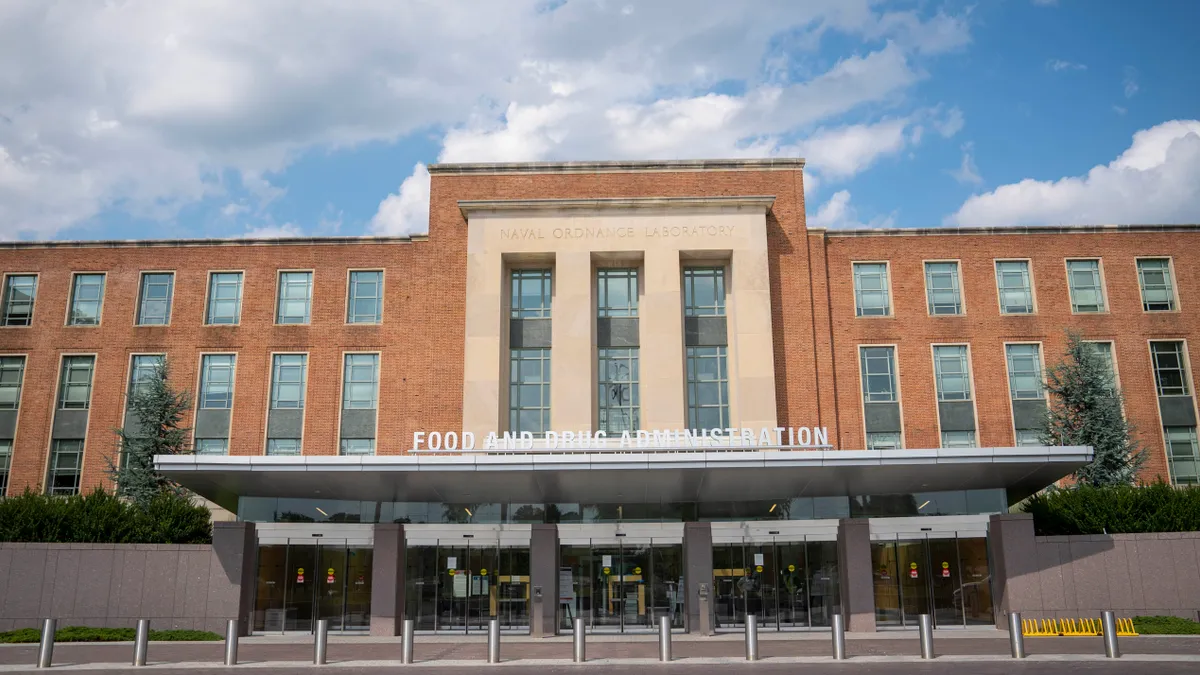Dive Brief:
- The Food and Drug Administration has warned patients and healthcare providers about the potential for noninvasive prenatal tests to deliver false results when screening fetuses for genetic abnormalities.
- The New York Times moved the subject of false positives up the agenda at the start of the year when it ran an article in January that claimed some tests are wrong more than 80% of the time. Analysts at Craig-Hallum contend the FDA warning is an official follow-up to the NYT article. However, as this week's FDA warning is against improper use of the tests and lacks new data, the analysts expect it to have little impact on Natera, one of the companies competing for the market.
- The American College of Obstetricians and Gynecologists (ACOG), one of the groups that could slow uptake, put out a response to the FDA warning reaffirming its existing guidance. The American Clinical Laboratory Association, whose members include Natera rivals Labcorp and Quest Diagnostics, issued a statement that noninvasive prenatal screening (NIPS) tests are "not equivalent to, nor intended to be used as, a diagnostic test for specific fetal conditions" and that ultimately "choices about prenatal screening are made by patients in close consultation with their healthcare provider."
Dive Insight:
The NIPS tests, sometimes called noninvasive prenatal testing (NIPT), analyze fragments of fetal DNA found in the pregnant person's blood to determine if there are genetic abnormalities. Initially used to screen for Down syndrome, tests have since expanded to cover other genetic conditions such as Prader-Willi syndrome. As the products are laboratory-developed tests, the expansion has happened without the FDA reviewing the evidence.
"Many laboratories that offer these tests claim the tests are 'reliable' and 'highly accurate,' offering 'peace of mind' for patients. The FDA is concerned that these claims may not be supported with sound scientific evidence. False claims may cause patients as well as healthcare providers to believe the test results are reliable and can be used alone to make decisions about the pregnancy," the agency wrote in its warning.
The FDA wants to ensure patients and healthcare professionals understand the limitations of the tests. In its warning, the agency advises against using the results of noninvasive tests to make decisions about a pregnancy because "the results of these tests may not accurately reflect whether your fetus has a genetic abnormality," while recommending that additional testing such as amniocentesis or chorionic villus sampling should be performed to determine if a fetus has a genetic abnormality.
Much of the FDA's advice is in line with the guidance of organizations such as ACOG, which the agency cites in its warning. ACOG's guidance recommends patients receive counseling from genetic counselors or obstetric care professionals when deciding whether to undergo noninvasive testing, as well as about the revised risk when a positive test result is obtained.
"Because of inherent limitations, screening test results should not be used as the sole basis on which to make critical clinical decisions. All patients, regardless of maternal age or baseline risk, should be offered both screening and diagnostic tests and all testing for chromosomal abnormalities should be an informed patient choice," ACOG wrote in its response to the FDA warning.
The response neutralizes a theoretical threat to increased test adoption. In their response to the FDA warning, the Craig-Hallum analysts said a change in ACOG's position could hurt test sales, while noting that such a shift in policy is "extremely" unlikely. With ACOG maintaining its course, the analysts think market forces continue to favor the growth of Natera and its rivals.
"Test adoption should only go higher. The simple reason is when NIPTs are used properly/follow the label they are vastly superior vs. the old standard of care that resulted in many more invasive procedures and false negatives. [Natera] and the other NIPT providers may look to update marketing material to better call-out the confirmatory requirement of the tests," the analysts wrote in a note to investors.
Natera's share price has fallen 60% since the start of the year but held steady after the FDA warning. The noninvasive prenatal testing specialist, which has a $3.5 billion market cap, competes against companies such as Labcorp and Quest Diagnostics for the market.










